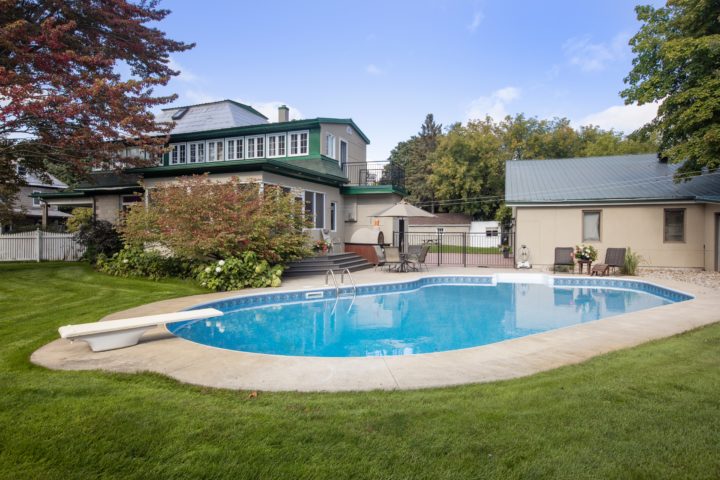A clean and sparkling swimming pool is essential to the summer experience. A well-maintained pool can provide hours of fun and relaxation, while an unclean one will not be enjoyable to swim in. Keeping your pool clean doesn’t have to be complicated or time-consuming; there are simple steps you can take to ensure that your pool stays crystal clear all season long. This blog post covers some easy tips on maintaining a clean swimming pool with minimal effort.
Invest in the Right Pool Cleaning Equipment
Modern tools, such as robotic pool cleaners, can help keep your pool clean and free of debris. These machines are designed to move around the pool while filtering out dirt, leaves and other particles from the water. They can be used both in above-ground and in-ground pools, although they tend to work best in larger bodies of water.
Robotic pool cleaners are a great way to keep your pool looking its best without vacuuming it manually. Regular use can significantly reduce the amount of time and effort needed for cleaning. When buying the best modern pool cleaner online, go to the right dealers. They should provide all the details about the product you need and provide unbeatable prices. Understand the efficiency levels of the various pool cleaners and choose one that best suits your specific needs.
Shock the Pool
Introducing a high dose of chlorine to the pool will help kill bacteria and algae that can lead to cloudy water. Shock your pool once every 7-14 days, depending on how often it is used and conditions such as sunlight and rainfall.
Remember that chlorine levels should always stay between 1-3 ppm (parts per million). If you notice your pool water becoming cloudy or discolored, shock it as soon as possible, then retest the chlorine levels in 24 hours.
When it comes to shocking your pool, you have two main options: Pre-Mixed Chlorine Shock or Dry Calcium Hypochlorite. With either of these options, make sure to read and follow the directions carefully on the product label.
Skim and Brush the Pool Regularly
Doing this to your pool will help remove debris such as leaves, twigs, and other organic materials that can make the water cloudy or cause bacteria to form.
Start using a skimmer net to remove debris from the pool’s surface. Use the right tools to brush or scrub the walls and floor of your pool weekly, paying particular attention to cracks, corners, and any other areas where debris might collect.
Remember that if your pool has a lot of visible debris, it’s best to vacuum it using a pool vacuum cleaner. You can do this yourself if you own suitable cleaning equipment, or you can instead call in the professionals to handle the debris for you. If you’re interested in hiring a professional to clean your pool, you can opt for a service like a pool cleaning by Premier Pool Service or a similar pool maintenance company operating in your local area. This will ensure the removal of stubborn dirt and bacteria that can cause cloudy water or algae blooms.
Deal with Algae Bloom Fast
If you find that your pool has algae bloom, it is crucial to treat it right away. The best way to do this is to brush the walls and floor of the pool and then shock the water with a chlorine or non-chlorine shock treatment. Once this is done, run the filter for at least 24 hours to help remove any remaining algae.
If the algae bloom persists, adding an algaecide product to the pool may be necessary. Again, ensure that your filter is clean and running before adding any chemicals, as this will help ensure the treatment is effective.
Test Water Chemistry
Weekly testing of the pool’s chemistry is one of the essential factors in maintaining clean and safe pool water. Test the pH, alkalinity, and chlorine levels with a pool test kit to ensure they’re in the proper range.
If any readings are too low or high, adjust them as necessary with chemicals such as pH and alkalinity increasers or decreasers, and chlorine shock. At the same time, it is vital to ensure that the chlorine levels remain between 1-3 ppm and are not too high.
Remember to check the water filter system as well regularly. Make sure it is clean and free of debris or dirt, as this can cause problems with circulation and filtration.
Maintain Pool Water Level
The level should be kept from falling below the middle of the skimmer opening. This will ensure that your filtration system is working correctly and efficiently. If the water level is too low, it can cause problems with the pump and other components of the pool equipment.
Besides the skimmer, you should also ensure that the pool’s primary drains are clear and unobstructed. If they become blocked, it can cause water circulation problems and potential safety issues.
After you do some pool modifications or repairs, be sure to refill the pool slowly and gradually. This will help prevent any damage from occurring due to rapid pressure changes on your pool’s walls.
Keep the Filter Clean
One of the most critical steps in keeping your pool clean is regularly cleaning or replacing the filter. A dirty filter will not efficiently remove dirt, debris, and bacteria from the water, leading to cloudy or murky conditions. If you have a cartridge filter, rinse it off with a garden hose every few weeks.
Backwash sand and diatomaceous earth (DE) filters as needed. This is usually every two weeks; replace the filter media when necessary. Read the manufacturer’s instructions for how often these components should be replaced.
At the same time, make sure to check the filter’s pressure gauge every week. When it reaches 8-10 PSI (pounds per square inch) higher than the starting level, it is time to backwash or clean the filter.
Vacuum the Pool
Vacuum the pool weekly, paying particular attention to corners, steps, and areas where leaves tend to accumulate. Ensure the pump is running while you vacuum, as this will improve circulation and filter any dislodged particles during the process.
Regular brushing of the walls and floor is recommended for this to be effective. This will help loosen any dirt or debris built up between vacuuming sessions. Remember that vacuuming should only be done when the filter is clean, as this will help prevent any clogging or damage to the system.
There are many simple steps that you can take to enjoy a consistently clean pool. Be sure to maintain regular maintenance and follow the manufacturer’s instructions for your equipment, chemicals, and supplies. This will help ensure that your pool remains clean, safe, and enjoyable all year round.
















